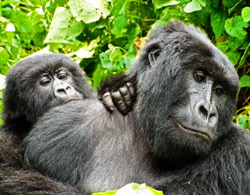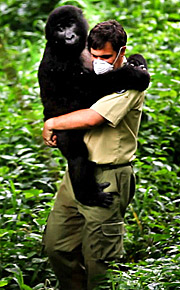It is difficult to imagine a more dangerous place to be a wildlife conservationist than the Democratic Republic of Congo (DRC), which for decades has been ravaged by war and civil strife that has left several million people dead. But it is against this backdrop that Emmanuel de Merode has waged a five-year struggle to protect Congo’s Virunga National Park, the oldest national park in Africa and home to one of the last sizeable populations of mountain gorillas.

De Merode, 43, is the chief warden of Virunga, a UNESCO World Heritage site that encompasses nearly 2 million acres of forests, mountains, savannahs, and volcanoes. It is home to a wide variety of iconic fauna, including elephant, rhinoceros, chimpanzees, hippopotamus, and more than 200 mountain gorillas — 20 percent of the world’s remaining population.
Protecting the park may well be the riskiest conservation job in the world, with more than 150 Virunga park rangers killed in the line of duty since 1996. Recently, much of the fighting between the government and various armed groups has been centered in and around Virunga, leaving de Merode and his rangers unable to monitor the gorillas’ fate for four months. In an interview with Yale Environment 360 contributor Christina M. Russo, de Merode discusses the challenges of protecting the mountain gorillas in a war-torn nation, the remarkable survival of the gorillas amid this strife, and how restoring order inside Virunga National Park could play a role in bringing peace to Congo.
Yale Environment 360: Last fall, a Virunga National Park ranger patrol was ambushed on Lake Edward by Mai Mai rebels. The attack left one ranger dead. Can you describe the conditions in which the rangers work?
Emmanuel de Merode: Well, it varies. There are periods when things are relatively stable. But more of the time over these last twenty years we have had periods of armed conflicts, and that put our rangers under very significant strain. They tend to be the last to leave because the national park has to be protected. They bear attacks when they’ve stayed and have remained the only governmental authority. And because of that, they get specifically targeted by these armed groups.
e360: You started a fund for the [murdered] rangers?
de Merode: Yes. The Fallen Rangers Widows Fund.
e360: This fund was your idea?
de Merode: I wrote a book a few years ago [Virunga: The Survival of Africa’s First National Park], which was all about the park, with some friends. And all the proceeds we kept aside for setting up this fund. And that’s how it started. Since then, the U.S. Fish and Wildlife Service has put money into it and we should hopefully get to a stage where we can provide a decent minimum for the widows and the orphans of the rangers who get killed. If we are unable to provide anything for their families we are left with a terrible situation… It is very, very difficult for us to maintain morale and hard to manage a team in those conditions. You’ve got their widows and orphans who are abandoned and left in a situation of extreme poverty with absolutely no safety net. So for many reasons it is an absolute priority for us to be able to look after the families of those who died protecting the park.
“It is an absolute priority for us to look after the families of those who died protecting the park.”e360: In early December, a small group of rangers, including yourself, was able to finally survey the gorilla sector of Virunga National Park after being unable to get into the park for four months. How did you finally get access — was it through negotiations?
de Merode: We were able to go back and have been able to maintain a constant presence. It took us a long time to negotiate the agreement, and it was because the battle zone was close to where we needed to be. There was contact between our rangers and armed personnel who were on high alert, so this was a very difficult and dangerous situation.
e360: Who are the armed personnel you refer to?

de Merode: At the time it was mainly M23 rebels. But there was a time when the front moved and so it would sweep through the gorilla sector. There were government forces there at times — in August they moved into that area.
e360: When you finally got access, much to your surprise you found a number of newborn gorillas.
de Merode: Yes. We were able to locate all six gorilla families and we were pleased about that. What was wonderful is that there was a remarkably high number of births — seven births. Of which four were in one group alone, which is now a large family of 37 individuals.
e360: Does this symbolize anything about the health of the gorillas?
de Merode: I would love to be able to say it’s a wartime baby boom, but it is just coincidence. It reflects that the population hasn’t been disturbed. We also didn’t have a registered death and that is much more significant. Seven births without any deaths in a five-month period is 25 to 30 percent growth — three times greater than what we would normally expect for the mountain gorilla population. It is a random peak, [but] it was a very nice result of that survey, especially given the level of concern that we felt for the gorilla population. There was a very real chance we would have lost some gorillas as a result of the combat in the gorilla sector.
e360: Have you been able to understand how the gorillas survive in the park with all the violence around them? For example, do you think they move away from the fighting?
de Merode: I don’t think they do, based on the contact we’ve had with them. We have a very close relationship with the orphan gorillas who are with us at Rumangabo, at the park headquarters. We stay with them when there’s fighting, when there’s a lot of gunfire or artillery fire. And they don’t move… With the mountain gorillas in the forest, it’s almost certainly the same thing — they get on with their lives, but they don’t move away from the fighting. So that obviously puts them at risk.
“These are extremely dangerous people. They’ve got blood on their hands.”But so far we’ve been incredibly lucky. There was a war in 2007 and 2008, very similar to the one we are experiencing at the moment. And the population actually increased by 12 percent during that period, even though the area was controlled by the military. While we were lucky in 2007, we weren’t so lucky in the first and second civil wars in Congo, in 1996 and 1998. We lost some gorillas that got caught in the crossfire and were killed.
e360: Can you explain what this recent spike of violence is about?
de Merode: It goes back to 1994, to the Rwandan genocide and the aftermath of those terrible events. All the militias responsible for the genocide, together with those members of the regular army who carried out

The mountain gorillas are in the area that the M23 now control. The conventional war is between the M23 and the regular army. But because of the instability it has provoked, a lot of the other armed groups have moved into the park. And that’s created what you could call a low-intensity war, for which our rangers are the main target, because the armies have evacuated the area and there’s only us left as a government security force… We are operating behind enemy lines, as it were. Right now, I’m driving in rebel territory.
e360: As we speak?
de Merode: Yes. So it is a very delicate situation. It’s not easy for us, but it’s not easy for them, either. Because no military commander likes to have the enemy behind their lines; it makes them very nervous. And so there’s a lot of discussion, we assure them we are not actors in their conflict. We protect wildlife. We do carry weapons — rangers have to in order to do their work.
e360: This park was created in 1925 and had the highest population of large mammals in the world at one time. Has the current central African poaching epidemic affected Virunga?
de Merode: The hippos are probably the most poignant, because it’s the world’s biggest population of hippos, or at least it used to be. So that went down from 27,000 in the 1970s to less than 350 individuals in 2005. It has since increased to about 1,200. And so the situation is evolving. Right now we are more concerned about the elephant population, which is being hit very badly because of the price of ivory and the very elaborate ivory trading networks that have surfaced in this area. The elephant population used to be around 3,000, and that’s gone down to about 300.
e360: In a quieter period, what does normal patrolling of the gorilla sector look like?
de Merode: Basically, we send teams of four or five rangers out every day. The teams have to locate the gorillas, and they spend about an hour with them, just checking on the health status, because that is actually one of the main threats, as disease is a real concern. But also to check that none of them have been caught in a snare or a trap, because poachers sometimes lay snares, so they have to keep an eye out for that. Snares are a real threat to our gorillas. We also work closely with members of the community, who go on these patrols with us. They are what we call our community scouts, and they are often our eyes and ears on the ground, to make sure the gorillas are okay.
“The first real challenge was rebuilding the national park service in Virunga.”e360: What were your original challenges when you took the post?
de Merode: The first real challenge was rebuilding the national park service in Virunga, restoring a high level of discipline among the rangers and giving them the support they needed to do their jobs properly. Also, there are almost 4 million people living within a day’s walk of the park boundary, [which] affects our ability to protect the park. So we’ve had to develop strategies to take care of their needs — things like charcoal, domestic energy. The two primary drives behind our work were rebuilding the corps of rangers so they can do an effective job, and generating value out of the park for a local population.
e360: How are you generating value?
de Merode: In three areas. The first is tourism. And the easiest way to explain that is to look at what has happened in other areas. If you compare this with Kenya, for instance, in 2010 the contribution of tourism to Kenya’s GDP was $3.5 billion — that is tourism dependent on its parks. The national budget for Congo is [only] $3.4 billion. So national parks potentially could have a major strategic economic benefit for the future of the country. So it’s not just the local community, but the country as a whole. It could be a pillar of the economy.
Second is park resources. With the support of the European Union, we have invested heavily in rural electrification, which can have a very high return in investment for alleviating poverty. Virunga has very high rainfall area and is mountainous, so the potential for generating electricity for improving peoples’ quality of life and generating employment through agriculture is enormous. We’ve just completed a half-megawatt plant, which should be functional next month. The basic principle is if you manage the park well you have healthy forests and, in turn, healthy rivers. And those rivers can create good sustainable livelihoods for rural communities that will have incentives to keep the park going.
Third is security. It is an area we have invested in heavily in the past 3 years… The commodity in greatest demand in Congo is security. If the park is managed well, it can stabilize the region. That means that Virunga’s rangers are involved not just in protecting wildlife, but also in security with the local community.
e360: You have said that Virunga can play an instrumental role in creating peace in the whole of eastern Congo. Can you expound on this point?
de Merode: Well, the eastern Congo is a huge area. But that part of eastern Congo where there’s the highest level of conflict is in and immediately around Virunga. So if it were possible to stabilize the park, that would have a very deep effect on the security in the area. The national park rangers have a natural role to play in restoring stability to this area. The other aspect of that is that this is a war that has been going on for 20 years now. And it’s now widely recognized that the underlying cause of that war is the illegal exploitation of natural resources. And many of those natural resources are in the park. So it’s the park’s role to ensure that the illegal exploitation of natural resources doesn’t happen. And should it succeed in doing that — which is what we are trying to do — then it would have a very significant impact on peace and stabilization.